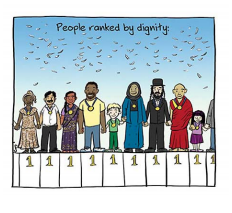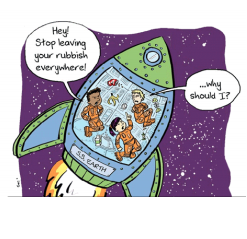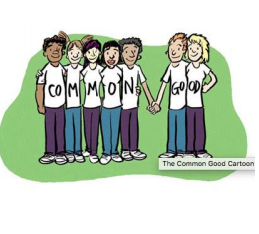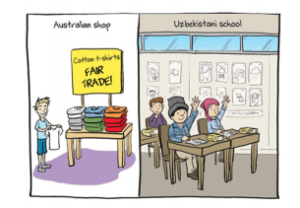Catholic Social Teaching
This week we are going to look at the list of actions that the Church has made for us as we try to live in the Kingdom of Heaven!
The list of ‘rules’ that the Church has written for us is called a set of principles. So, first, let’s learn about what a principle is.
- A principle is a kind of rule or standard. It offers guidance to us so that when we have to make a decision or choose which way to act we have some ideals to work towards.
- Principles are often very big statements without a lot of detail attached. In your class you might live by the principle ‘we care for each other and ourselves’. The principle doesn’t tell you every single thing you should do (like speak respectfully to each other, listen to each other, look carefully before you cross the road etc) instead it just says: ‘care for yourselves and each other’. You have to work out how to do that.
Activities
Here is a principle: Practice thankfulness.
You can see that it’s a bit like a rule, but that its very big and doesn’t tell you exactly what to do.
If we practice thankfulness we might make sure that we notice and appreciate everything we have. It might mean we say thank you for it…to the people who gave it to us, who shared it with us, who allowed us to have it.
If we practice thankfulness we might notice and appreciate all the people who help us, think about us, support us and include us.
If we practice thankfulness we might stop grumbling about what we don’t have; because we realise we have so much.
Make a diary in your books for the week of what you can be thankful for. Every day, write about something or someone you are thankful for.
Live the principle of practicing thankfulness
| Since 1893, as part of their role as the head of the Catholic Church Popes (including Pope Francis) have ‘looked out their windows’ to ‘mark’ how the world was going in bringing about God’s Kingdom. Sometimes they felt that things were going ok, but often they felt that there were things society was not doing well. In 2004 the Church wrote a summary of all the documents that had been written since 1891 on what the Church thought and published them in a book called The Compendium of the Social Doctrine (Beliefs or Teachings) of the Church.
|

| Principle Image | Name | Meaning |
 |
The principle of Dignity of the Human Person | We know that everyone is important and valuable: no one is better than anyone else. |
 |
The principle of Preferential option for the Poor | We share what we have so that everyone gets some; we make sure the people who have the least get served first. |
 |
The principle of Stewardship – Care of our common home | We remember that the world is everyone’s home (even those people who haven’t been born yet!) and so we don’t mess it up. |
 |
The principle of the Common Good | We work together so that our community is good for everyone to live in |
 |
The principle of Solidarity | We stick together, and when we find that people aren’t being treated well or are being taken advantage of, we work to make it fair for them. |
 |
The principles of Subsidiarity and Participation | We make sure everyone gets a chance to talk about decisions. We make sure we include those who will be most affected by any decision. |
Choose some of the activities below
Choose 3 principles that you understand draw or write what you do in your home or school to live this principle.
To learn a little bit more about each principle visit the caritas site and read about the cartoon and watch the short videos.
https://www.caritas.org.au/learn/cst
Discuss which principle you think is the most important?
Look at all the principles and put them in order: most important to least important.
Answer
| The principle of human dignity is the parent principle! It says that everyone is equally important and valuable. Just because you might win prizes, be able to count further or run faster or draw better or earn more money than someone else, doesn’t mean you are better than them. Boys and not better than girls, tall people are not better than short people, people born in Australia are not better than people born in Europe and people who are young are not better than people who are old. The principle of human dignity says that every person is important and precious so people should not be ‘ranked’ by what they can do. People have worth and value and dignity just because they are humans. |



Leave a Reply
Want to join the discussion?Feel free to contribute!